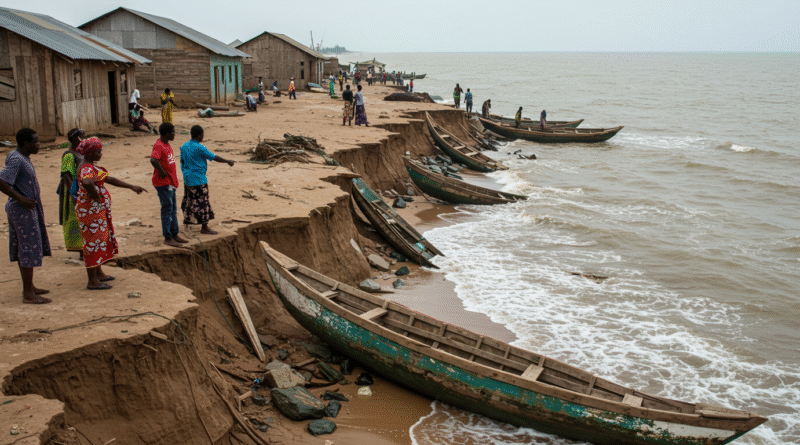Lagos coastal erosion crisis
The Lagos coastal erosion crisis has reached alarming levels in Apakin, a small fishing community on the edge of Lagos. For decades, the sea has eaten away at the shoreline, but now the pace of destruction has become unbearable. Locals say 80 percent of their coast has vanished over the last 50 years, swallowing homes, fishing livelihoods, and even ancestral graves.
Industrial Projects Intensify the Loss
The causes are both natural and man-made. Relentless sea surges, driven by climate pressures, have been compounded by nearby industrial projects. Deepwater port construction and the development of a major refinery have disrupted tidal flows, accelerating the loss. Where once fishing boats lined the shore, there is now a watery expanse that has claimed both property and tradition.
Promises Without Protection
Residents recall promises of protection under the Living Lands Charter, but little has been done on the ground. There are no seawalls, no reinforced embankments, no evidence of dredging—only memories of pledges that remain unfulfilled. “Every year, the water comes closer. We bury our dead, and the sea takes them back,” one community elder said, pointing to patches of sand where graves once stood.
A Warning for Lagos
The erosion is more than a local tragedy. It is a warning shot for Lagos, a megacity of more than 20 million people built on fragile coastal terrain. Experts caution that without urgent, concrete action, what is happening in Apakin could spread, undermining lives, livelihoods, and critical infrastructure across Nigeria’s commercial hub.
Niger Flooding Real Estate Crisis: Lives Lost, Futures Drowned
Effect on Real Estate and Climate
The crisis in Apakin is not just about a disappearing shoreline—it is a glimpse into the future of real estate and climate resilience in Nigeria and beyond.
For Nigerian real estate, the erosion places billions of naira worth of property at risk in coastal areas like Lekki, Victoria Island, and Eko Atlantic. Luxury estates built close to the ocean could face depreciation or outright destruction if protection systems fail. Rising seas threaten not only fishing communities but also high-value developments and infrastructure that underpin Lagos’s status as Nigeria’s commercial nerve center.
Across Africa: the story mirrors threats facing coastal cities from Abidjan to Dar es Salaam, where rapid urbanisation collides with climate vulnerability. Without resilient planning, Africa’s most ambitious real estate projects could become stranded assets, undermining investor confidence and worsening inequality as the poor are displaced first.
Globally: Lagos’s erosion crisis is part of a wider climate emergency. From Miami to Jakarta, coastal cities are grappling with rising seas, forcing governments and investors to rethink the true cost of coastal development. Real estate markets everywhere will increasingly be judged by their resilience to climate change, with financing, insurance, and investor flows shifting away from high-risk zones.
Why You Need to Hear this
What is happening in Apakin today could happen in Lagos tomorrow and in other coastal cities the day after. The loss of land is not only cultural or emotional; it is financial, structural, and deeply tied to where people can safely live and invest. Protecting coastlines is no longer just an environmental duty—it is an economic necessity.
Nigeria Is Heating Up Fast — And It’s Changing Everything
Conclusion
For now, the people of Apakin continue to live with the tide at their door. What they demand is not sympathy or statements, but immediate protection. As one fisherman put it bluntly, “We don’t need words anymore. We need walls to hold back the sea.

